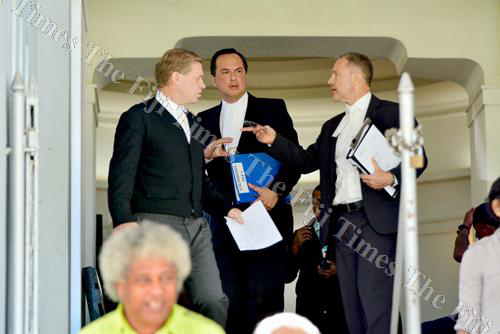
SUVA (The Fiji Times/Pacific Media Watch): The publisher of The Fiji Times has no involvement or input in the content of its publications, editor-in-chief Fred Wesley has told the High Court in the "sedition" trial.
As the first witness for the defence, Wesley clarified this was to ensure editorial independence and no influence from outside parties.
Wesley said he was the editor of The Fiji Times newspaper under the Fiji Times umbrella where there were three other publications - the iTaukei vernacular newspaper, Nai Lalakai, the Hindi vernacular newspaper Shanti Dut and The Sunday Times publishing once a week on Sundays.
READ MORE: There are guidelines, says Fiji Times editor
He said the editors of the various newspapers (publications) reported to him as editor-in-chief and the only time he offered advice or direction to them was when an issue was referred to him.
Wesley said after their publication was completed, he would be briefed by the various editors of the various publications and they would discuss what went on pages one, two and three and what went on the sports pages, but he did not make decisions on the content of the other publications or on the letters they ran.
Wesley said these editors were responsible enough to decide on what to bring to his attention if they were in doubt, what to drop and what to run. He said after the editors authorised their pages and sent them for production, he was usually briefed, but not on the letters.
He said he also ensured that there was no interference in publication on a daily basis.
Sedition charges
Wesley is charged with Nai Lalakai editor Anare Ravula with one count each of having aiding and abetting the publication of a seditious article while The Fiji Times publisher Hank Arts is charged with one count of publishing a seditious article in Nai Lalakai.
Letter writer Josaia Waqabaca is charged with one count of submitting for publication an article written by him with a seditious intention, while Fiji Times Ltd is charged with one count of printing a seditious publication.
Ravula and Waqabaca yesterday opted to exercise their right to remain silent while the company confirmed it would be calling two witnesses.
Wesley said with the letters to the editor for The Fiji Times newspaper, he received letters from the public through mails and electronic mail. Wesley said the letters to the editor column was a forum that allowed readers to raise their concerns and if he was in doubt of any letter, he would send them to the newspaper’s legal team.
These issues include letters that were related to defamation, issues of ethnicities or religion. Wesley said all editors had the powers to refer letters to lawyers if they were in doubt.
He said he never received nor did he read or had any knowledge about a letter that was allegedly published in the Nai Lalakai newspaper. Wesley said he also did not cause to publish the letter and he only came to know of the letter when he was arrested and charged by police.
No complaint
When being asked by Waqabaca’s lawyer, Aman Ravindra-Singh during cross examination as to whether he had received any complaint against the alleged seditious article from the Permanent Secretary for iTaukei Affairs or its line minister, Wesley said he did not.
While responding to cross-examination by Ravula’s lawyer, Devanesh Sharma, Wesley said Nai Lalakai was a separate publication that subedited, copyedited and produced its own paper.
He said the three other publications, apart from The Fiji Times which came under him, were expected to send all letters of concern to them to the lawyers and that staff members of all publications have been made aware of these concerns through various training on the Media Act, the Constitution and other guidelines relevant to the journalism profession.
He said the penalties in the Media Act were quite hefty which prompted the editors to enforce vigilance in their work.
This work is licensed under a Creative Commons Attribution-NonCommercial 3




